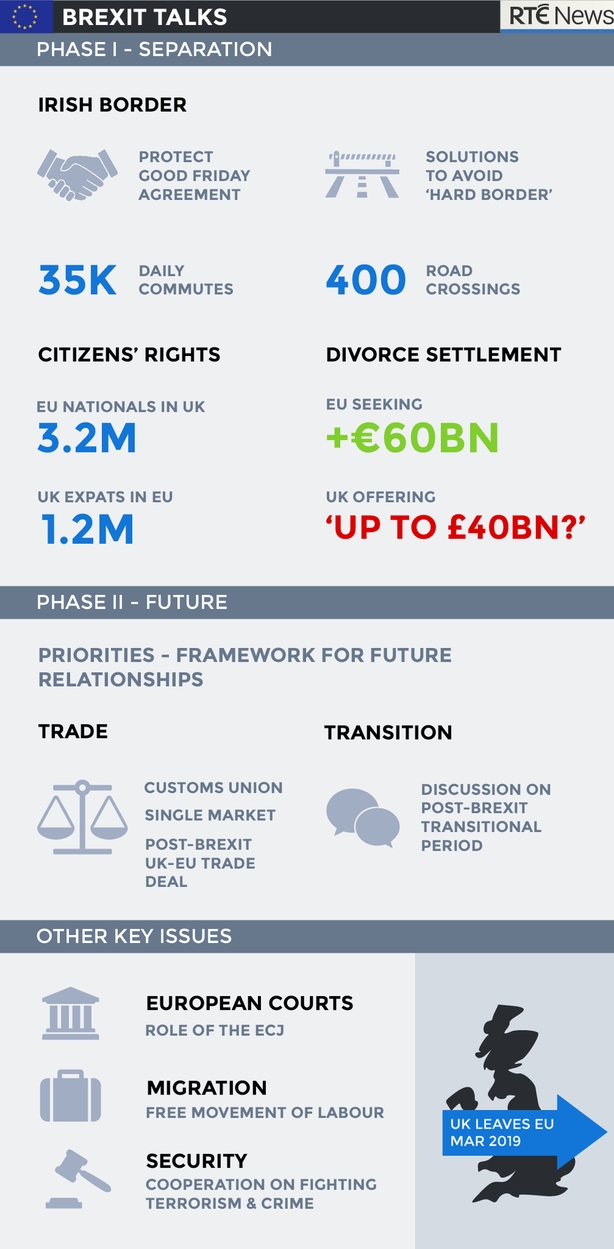British Prime Minister Theresa May has faced fresh pressure over her plans to deal with the Northern Ireland border after Brexit, as Ireland's European Commissioner Phil Hogan urged the UK not to leave the single market and customs union.
Mr Hogan said the problems around the border - one of the key obstacles blocking talks on a UK-EU trade deal after the UK leaves the bloc - could be solved by remaining in the customs union and single market, or allowing Northern Ireland to do so.
However, Britain's International Trade Secretary Liam Fox said resolving the border issue cannot be completed until talks on the trade deal with Brussels have concluded.
He told Sky News's Sunday with Niall Paterson: "We have always had exceptions for Ireland - whether it's in our voting rights, our rights of residence in the UK, we have always accepted a certain asymmetry and that will have to be part of whatever agreement we come to with the European Union but we can't come to a final answer to the Irish question until we get an idea of the end state.
"And until we get into discussions with the EU on the end state that will be very difficult, so the quicker that we can do that the better and we are still in a position where the EU doesn't want to do that."
Mrs May has been given until 4 December to come up with further proposals on issues including the border, the Brexit divorce bill and citizens' rights if European leaders are to give the green light to moving on to the next phase of negotiations covering the future relationship between the UK and Brussels.

Mr Hogan, the EU's agriculture commissioner, said it was a "very simple fact" that "if the UK or Northern Ireland remained in the EU customs union, or better still the single market, there would be no border issue".
He told the Observer newspaper: "I continue to be amazed at the blind faith that some in London place in theoretical future free trade agreements.
"First, the best possible FTA with the EU will fall far short of being in the single market. This fact is simply not understood in the UK.
"Most real costs to cross-border business today are not tariffs - they are about standards, about customs procedures, about red tape.
"These are solved in the single market, but not in an FTA."
We need your consent to load this rte-player contentWe use rte-player to manage extra content that can set cookies on your device and collect data about your activity. Please review their details and accept them to load the content.Manage Preferences
Mrs May has ruled out remaining in the single market and customs union and any arrangement which appeared to give Northern Ireland a separate status would be strongly resisted by the DUP, whose 10 MPs are effectively keeping Mrs May in Downing Street after she lost her majority in the general election.
DUP leader Arlene Foster told her party conference yesterday: "We will not support any arrangements that create barriers to trade between Northern Ireland and the rest of the United Kingdom or any suggestion that Northern Ireland, unlike the rest of the UK, will have to mirror European regulations."
Meanwhile, it emerged the UK could be required to follow new rules implemented by the EU during a Brexit transition period.
The position, set out by Michel Barnier in leaked documents, would make the application of new EU rules a condition of a transitional deal, meaning Britain could be subject to further Brussels' regulations for about two years after leaving the bloc.
Mrs May hopes to secure an implementation period between the UK's formal exit date and the commencement of any post-Brexit trade deal in order to give businesses time to adjust to the new arrangements, but accepting the imposition of new rules could trigger a revolt by Eurosceptics.
It would also go against the approach to an implementation period set out by Mrs May in her Florence speech, where she said the "framework for this strictly time-limited period ... would be the existing structure of EU rules and regulations".

